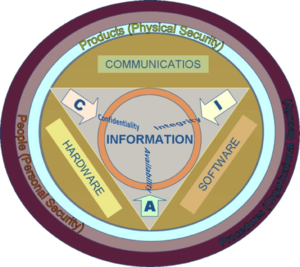
 Image via Wikipedia
Image via WikipediaWhat's the problem?
There is no title bar.
It is a house without a roof, a body without a head, an iceberg that has no tip...
It is a shame...
Now I'm down to only one: Semagic.
Even with my current job as a systems analyst, a software developer/programmer, I felt a need to document my learning, so I have something to always look back to, especially with my advancing age. But no, I'm not that old yet...

 Image via Wikipedia
Image via Wikipedia Image via Wikipedia
Image via Wikipedia Image by Shekhar_Sahu via Flickr
Image by Shekhar_Sahu via Flickr
 Image via Wikipedia
Image via Wikipedia
Google stops China censorship, Beijing condemns move
Posted: 23 March 2010 1508 hrs
WASHINGTON - A day after Google said it would no longer censor its search engine results in China, angering Beijing, Chinese access to websites covering sensitive topics remained blocked Tuesday.
Google announced Monday in a blog post that it had shifted mainland Chinese users of its Google.cn search engine to an uncensored site in the former British colony Hong Kong, drawing anger from Beijing and raising questions about the Web giant's future in the world's biggest online market.
But Tuesday, searches from mainland computers of subjects like "Falun Gong" and "June 4" -- referring to the Tiananmen pro-democracy protests in 1989 -- produced the message: "Internet Explorer cannot display the web page."

-----
A stand builder fixes a Google logo at an exhibition booth
-----
The same searches on Google.com.hk from computers in Hong Kong displayed full results -- suggesting that China was deploying its "Great Firewall" of web censorship.
While ending censorship in China, the Mountain View, California-based Google said it planned to keep sales, research and development teams in the country of some 384 million Internet users.
Google's decision came a little more than two months after the Internet titan threatened to close its Chinese operations because of censorship and cyberattacks it said originated from China.
China said Google was "totally wrong" to stop censorship and blame Beijing for the cyberattacks that allegedly targeted the email accounts of Chinese human rights activists.
"Google has violated its written promise it made when entering the Chinese market by stopping filtering its searching service," said the official in charge of the Internet bureau of the State Council Information Office.
"We're uncompromisingly opposed to the politicization of commercial issues, and express our discontent and indignation to Google for its unreasonable accusations and conduct."
The White House said it was "disappointed" Google could not reach a deal with Beijing and reiterated that US President Barack Obama is "committed to Internet freedom and... opposed to censorship."
Drummond, Google's top lawyer, said "figuring out how to make good on our promise to stop censoring search on Google.cn has been hard.
"We very much hope that the Chinese government respects our decision, though we are well aware that it could at any time block access to our services."
Google co-founder Sergey Brin told The New York Times that shifting the Chinese service to Hong Kong was not given a clear-cut stamp of approval by Beijing but "there was a sense that Hong Kong was the right step."
"There's a lot of lack of clarity," he said. "Our hope is that the newly begun Hong Kong service will continue to be available in mainland China."
Drummond said "the Chinese government has been crystal clear throughout our discussions that self-censorship is a non-negotiable legal requirement."
He said providing uncensored search from Hong Kong is "entirely legal and will meaningfully increase access to information for people in China."
Beijing tightly controls online content, removing information it deems harmful such as pornography and violent content, but also politically sensitive material.
Google launched Google.cn in January 2006 after agreeing to censor websites for content banned under Chinese law. Google.cn is the second-largest search engine in China after Chinese search engine Baidu.com.
Google's decision to end censorship in China was welcomed by human rights and technology groups and US lawmakers.
"It is a remarkable, and welcomed, action and an important boost of encouragement for millions of Chinese human rights activists and political and religious dissidents," said US Representative Christopher Smith, a Republican
from New Jersey.
Arvind Ganesan, business and human rights director at Human Rights Watch, called it "an important step to challenge the Chinese government's use of censorship to maintain its control over its citizens."
"Google has taken a courageous position against censorship," said Lucie Morillon of Paris-based media rights group Reporters Without Borders.
Leading Chinese dissident Wei Jingsheng, who spent nearly two decades in prison and now lives in the United States, said he knew China "would not back down."
"But we also knew that Google's motto was 'Don't be evil.' So there was no point on which to compromise," Wei said.
Leslie Harris, president of the Center for Democracy & Technology, praised what she called Google's "continued effort to enable China's people with unfiltered access to robust sources of information from all over the world."
- AFP/ir
From ChannelNewsAsia.com; see the source article here.
----------
 Image via Wikipedia
Image via Wikipedia
China says Google "totally wrong" to stop web censorship
Posted: 23 March 2010 0655 hrs
BEIJING - China said Tuesday Google had "violated its written promise" and is "totally wrong" to stop censoring its Chinese language search engine and to blame Beijing for alleged hacker attacks.
The comments came from an official in charge of the Internet bureau of the State Council Information Office, according to the state-run Xinhua news agency.
"Google has violated its written promise it made when entering the Chinese market by stopping filtering its searching service and blaming China in insinuation for alleged hacker attacks," said the official.
"This is totally wrong. We're uncompromisingly opposed to the politicisation of commercial issues, and express our discontent and indignation to Google for its unreasonable accusations and conducts," the official added.
Hours earlier Google said it had ended censorship of its Chinese-language search engine Google.cn and was redirecting mainland Chinese users to an uncensored site in Hong Kong.

-----
Google China office in Beijing
-----
Google also said it intended to continue research and development work in China and to maintain a sales presence there.
Google's lifting of censorship on Google.cn comes a little more than two months after the Mountain View, California-based company said it had been the victim of cyberattacks originating from China.
The White House said it was disappointed that Google could not reach a deal with Beijing.
"We are disappointed that Google and the Chinese government were unable to reach an agreement that would allow Google to continue operating its search services in China on its Google.cn website," National Security Council spokesman Mike Hammer said in a statement.
- AFP /ls
From ChannelNewsAsia.com; see the source article here.
----------
 Image via Wikipedia
Image via Wikipedia

Image via Wikipedia
I have always been a fan of complex softwares – and most especially when these are freebies.
Anyway, one simple functionality that has always fascinated me is shutting down a PC automatically. When I don’t need to worry about getting the harddisk so hot after being on for long, long hours, or that the PC is simply running idle, etc., etc., then why not do auto shutdown?
I searched through the web, and of course, there are a myriad of available softwares, some free, while some, you have to buy. And guess what, some are simple, while others are so complex that you get more than what you actually wanted initially, and still, pardon the jargon, some are giving you more of their ‘crap’.
Solution?
I checked here and there, and it is as simple as
1. creating a .bat file in notepad.
2. putting in just 2 lines:
cd\
shutdown –s
(actually, only the 2nd line matters)
3. schedule a task that calls up your batch file (your filename.bat in step 1), where you specify the frequency and run time of your simple but effective auto shutdown ‘program’.
C’est tout!

Image via Wikipedia
As much as I am wanting to still use Zonealarm in Windows 7, after about half a year of trying another firewall software running in Windows 7, I don’t think that Zonealarm will be able to run in Windows 7 without causing any trouble.
I mean, I did try it many, many times – perhaps about 10 times – to see which software is causing my PC to hand up and freeze, with plugging off the only way to shutdown the machine.
Only when I uninstalled ZoneAlarm (at least I’m trying the free version), then my machine went back to working properly and smoothly.
And I’m running now a legal version of Windows 7. I just bought the upgrade version, since my current set-up qualifies me to do that, and the money side as well. It’s more economical, as what the Windows support lady insisted.
So, what’s your experience. I mean, way back when Windows 7 was starting to get broadcasted and installed, I have already read in many forums that Zonealarm may not work. 6 months down the road after my first encounter with Windows 7, which I also tried ZoneAlarm back then, still the incompatibility existed.
So right now, I am using MSSE, the Microsoft Security Essential, and I should be covered just the same.
And just like most of things in our lives, computing is also a personal experience. So what’s your story?
 Image via Wikipedia
Image via Wikipedia
 Image via Wikipedia
Image via Wikipedia
 Image via Wikipedia
Image via Wikipedia
 Image via Wikipedia
Image via Wikipedia